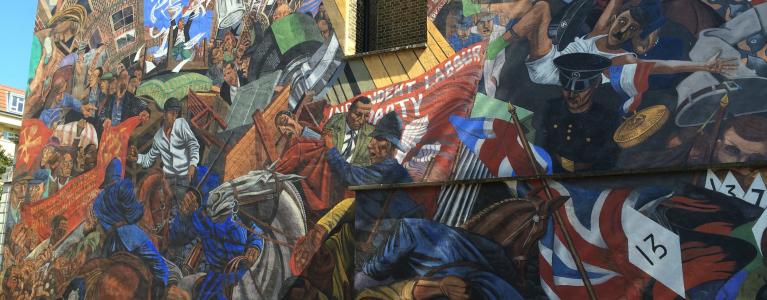
David Rosenberg leads tours of London’s historical East End. He tells us why 1936’s ‘Battle of Cable Street’ still matters today…
On Sunday 9 October, people will gather in the East End to remember the 80th anniversary of The Battle of Cable Street. On that day, different communities showed solidarity. They showed a spirit of resistance. They showed courage. Fascist forces were on the march in many European countries in 1936. Here in London, they were pushed back.
The residents of Cable Street were at that time mainly Jews at one end and Irish Catholics at the other. They were caught in the crosshairs of a political war that spilled on to this street. Britain’s would-be fascist dictator, Sir Oswald Mosley, had built a power-base among east London’s hungry workers and youth. His party’s four branches there surrounded a poor Jewish ghetto.
Mosley chose 4 October 1936 – the fourth anniversary of the birth of his movement – to invade the area. Nearly 100,000 East Enders – Jews and non-Jews – petitioned the Home Secretary a few days before asking him to ban Mosley’s march. They warned it would inflame local tensions. But he defended Mosley’s free speech and free movement. And 7,000 police were sent to protect his path.
Undeterred, the campaigners decided if the authorities wouldn’t stop the march, the people would. On the day, the anti-fascists vastly outnumbered both Mosley’s forces and the police. They blockaded the streets, chanting, “They shall not Pass!” Irish dockers and railway workers helped Jews build barricades using an overturned lorry, wood and sheet metal with furniture stacked behind.
As police tried to dismantle the barricades, dozens of people were arrested. Paving stones were ripped up. Bricks flew, and angry Jewish women threw bottles, kitchen utensils and the contents of chamber pots on to police from Cable Street’s tenements. Eventually the police retreated and order Mosley to walk his troops in the opposite direction. The day became known as The Battle of Cable Street.
The point where people will gather on 9 October and the destination are significant: The march will start at 12 noon in Altab Ali Park, on Whitechapel Road, near Aldgate East. This park is named after a young Bengali clothing worker stabbed to death by young racists as he was walking home from work on 4 May 1978. The struggles of the Jews in the 1930s against Mosley’s fascists were replayed by east London’s Bengalis in the 1970s.
These struggles were about defending themselves, but also about defending London as a city of diversity and harmony against those who tried to pitch neighbour against neighbour. Londoners should celebrate and be proud of our city’s history of opposition to hate. Please do come and join us on 9 October.
David Rosenberg